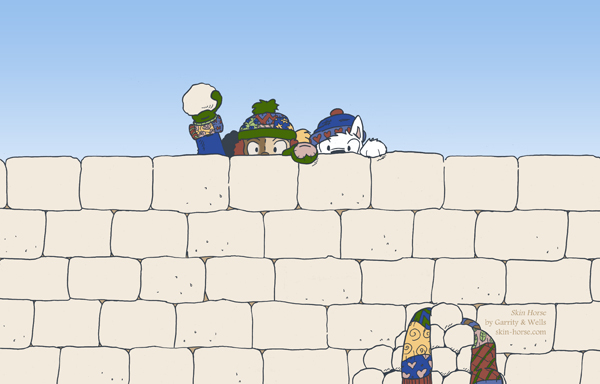January 2020 Wallpaper: Snowball Fight
Shaenon: Look, Jeff! It’s a dog in a hat!
As usual, if you make a donation in any amount to the Skin Horse Tip Jar, or contribute any amount to our Patreon, we’ll give you a link to this wallpaper, designed for two computer desktop sizes and cell phones. Patreon contributors will continue to receive new wallpaper for the length of their contribution.
As a bonus, you’ll get this January wallpaper from the archives:
Channing: I’m a simple man, and I have simple likes. Although I’m also loving Unity’s Kilroy Was Here pose.



A good snowball fight is always in order.
My first thought was that the snowball pile shouldn’t be in front of the wall.
But then I realised that those were just the ones that wouldn’t fit BEHIND the wall.
That pile is what hunters refer to as “bait”.
“Hey! Dropping giant snowballs on us from 200 feet up is _definitely_ not in the international snowball fight standards!”
“Those weren’t written with helicopters in mind, grunions!”
Just to nitpick (I like this word), while the first two and the last cards are titled with nouns, the third isn’t. Is there a reason?
I would suspect it’s so they all end with “ique”, but “psycholgie” ruins that theory. And FWIW, “mecanique” is both a noun and an adjective. Add an “s” and “atomiques” is a noun.
uh.. no sorry, atomiques wouldn’t be more of a noun. I mean any adjective can be turned (against it will) to a substantive, but most of time it functions rather as a pronoun and is postposed between comas (“Mata Hari, l’incroyable”), with the grammatical look of a noun (article + word), but the semantical and grammatical function of an epithet like by Homer – which means you can, if the qualified noun has already been used in the former text and only in this case, use it in lieu of the noun: a pronominal use, as I said.
ATILF rest my case here: https://www.cnrtl.fr/morphologie/atomiques
If you meant something else, sorry I missed the train.
Just going by what I find in my French dictionary. Atomiques = n. atomics.
What the name of the dictionary, editor, year of release? I need this parafrench to research linguistics I don’t know about! It could help improve my skills as word forensic, or at least at science fiction writing.
It’s funny you should ask. The only place I can find it is in the French dictionary app on my phone (from VidaLingua).
I tried to confirm it with a dead-tree version – I have 5 different editions – but not one of the ones I have shows “atomics” in the English side (in fact, one of them doesn’t even have “atomic”, which I found quite odd, considering the 1901 edition at least has that).
But since we’re on the subject of words that are not nouns, “forensic” is an adjective, so you can’t be a “word forensic”. The proper term is “forensic linguist” (as in Antonio Smith).
Thanks for this! I am only a passable english speaker so it helps to be corrected (I noticed I used “word” in place of “linguist”, but I thought it didn’t mattered where I put it, I won’t make the error twice! I wish!).
I hope my sometimes broken, sometimes overly trivial or snobby english (no I don’t put capitals to nationality or languages, it only encourages them) don’t hinder too much the comprehension.
I’m curious to know what “dead trees” dictionaries you use, not being an anglicist, I only know of Harper and Collins (whereas as a germanist I have like 6 of them). I tried to check VidaLingua but since I use a oldskool PC, I can only see ads on their site.
I wasn’t kidding about writing Sci-fi, since forging words is an important part of any space opera/sci-fi setting (and our most talented writer these days is quite big on this), and english is quite impregnating french anyway (particularly among the “elites” that tend to forgot there are words already existing and that carbon copies of english words lose some significations during the translation). When I was a teach, I frequently had to debunk the existence or nonexistence of frenglish (or denglish) words because some student saw it online and not only didn’t bother to check, but refused to admit I could be right. Kids, these eons… I mean I’m always right, it comes with the job, kids, along with a strong voice, ability to see you’re cheating without needing to see it, and depression.
A word is just a word. A linguist, however, studies words – and more to the point, studies languages.
The dictionaries I was using (and it seems there are only 3 of them – it just felt like 5 because of how many times I looked through them) are
Spiers and Surenne’s French and English Pronouncing Dictionary (D. Appleton & Co., 1852)
Cassell’s French and English Dictionary (Macmillan Publishing Co., 1968)
The Wordsworth French Dictionary (Harrap Books Ltd., 1994)
And students always question their teachers. It’s in their nature. The difference between good and bad students is that good students question their teachers respectfully, and they accept it when the teacher (as is almost always the case) turns out to be right.
I studied linguistics (and, separately, some languages), but I don’t consider myself a linguist, hence why I only used “word”. That said, the definition of what a word is quite tricky.
Thanks for the dictionaries. I forgot about Harrap’s Wordsworth, of course they are in use here too (for anglicists mainly). I found through Lexilogos that there is a 1912 edition of Spiers and Surenne’s available freely on the web, on archive.org, always a good thing to know.
The translation for “atomics” would be “physique nucléaire”, and most surely it wouldn’t be translated at all in papers since publishing in french tend to be so 2000. There may be no entry for atomic if the use is considered too small to be separated from the entry for the noun atom, I don’t know.
And respect between teachers and students is a vast question, with many factors: among others, being in fact respectable (legitimate), looking respectable (and feeling that way), teaching certain ages and classes in certain schools in certain places (I’ll always remember the place where students used to *hit in the stairways and the library)…
I correct myself, trnslation would be in most case be “physique atomique”, not the same thing.
Or perhaps “sciences atomique”.
sciences atomiques (plural) may not make that much sense, it’d be science atomique, which has a very Jules Verne/19th century feeling to it – adding science to atomique has some redundancy for most french people, who don’t know about greek philosophers. Anyhow, the usual academical term was, since the 19th and forward, “physique atomique”. Can’t say precisely why since I’m not a scientist. Naturally, physique nucléaire is pretty much the same field ++ (subatomic research by the CERN, which is Centre Européen de Recherche Nucléaire), and even more common, but if it can be used to translate atomics in most contexts, it is not as exact a translation, within a reasonable amount of “traddutore traditore”.
Incidentally, the Spiers and Surenne’s is the one I referred to above as “the 1901 edition”, because it was printed in 1901. But the copyright was in 1852.